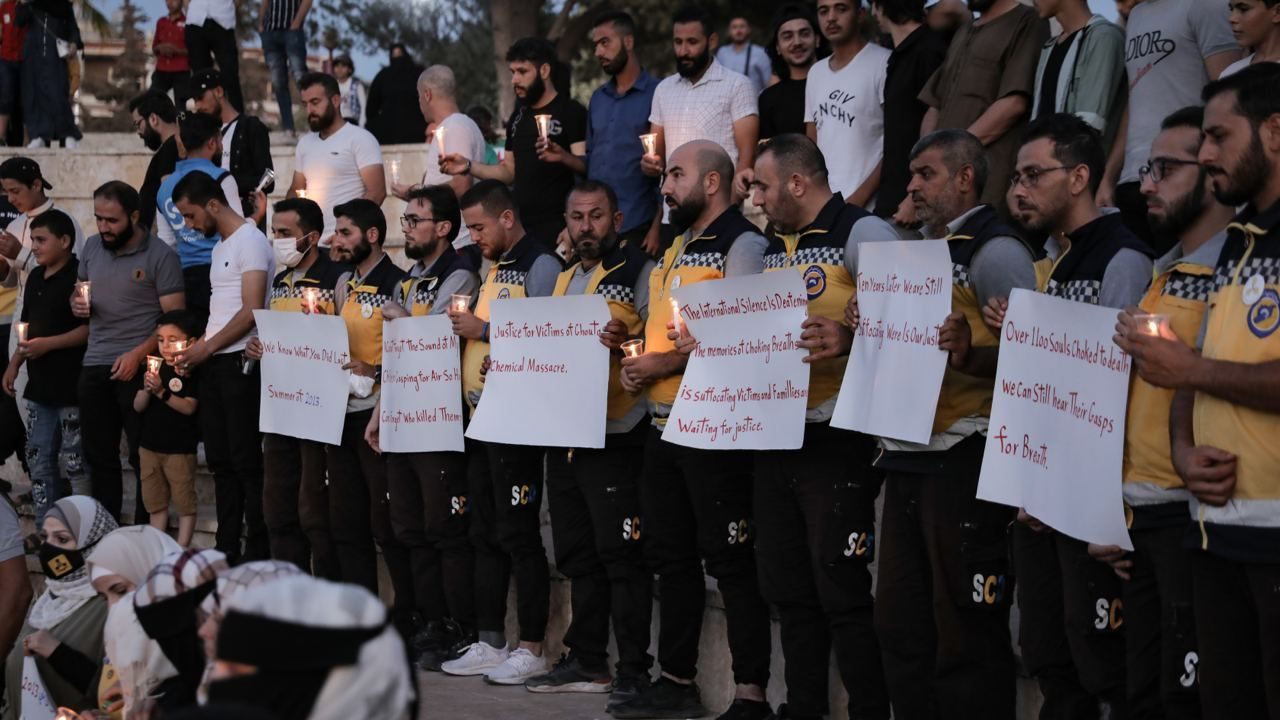On Monday, Syrians solemnly commemorated the tenth anniversary of a tragic event etched deeply into their collective memory: the night when countless families in Eastern Ghouta, Damascus, were plunged into darkness and anguish. This haunting night marked the onset of a series of heart-wrenching photos and videos that captured the anguished cries and sombre fatalities inflicted by the Assad regime.
The date, August 21st, 2013, stands as a grim reminder of one of the gravest crimes against humanity in the twenty-first century. On this fateful day, the Syrian regime perpetrated a massacre against the inhabitants of Eastern Ghouta. This brutal act involved the deployment of toxic sarin gas, claiming the lives of hundreds of innocent civilians.
Amidst the turmoil of that night, the duty of rescue did not rest solely upon a specific group; rather, it was shouldered by all able-bodied individuals who valiantly assumed the responsibility of aiding the wounded, undeterred by the inherent perils. Protective measures were limited to damp cloths held over noses and mouths, as the suffocating odour of sarin spared no one. The gaze of the deceased and the pleas of the desperate overwhelmed the resolve of even the most steadfast responders.
Tragically, the toll of this massacre reached a staggering figure of approximately 1,400 lives lost, as meticulously documented by dedicated activists. The Syrian Network for Human Rights undertook the grim task of memorializing the names of 1,144 individuals who succumbed to this unspeakable tragedy.
Events to commemorate the massacre
In remembrance of the Assad regime’s tragic chemical massacre, The White Helmets orchestrated a poignant “Lighting Candles” ceremony, a moving tribute shared across social media platforms. This event serves as a solemn homage to the victims who fell victim to the harrowing chemical attacks within Damascus Ghouta.
In an official statement, The White Helmets expressed that a full decade has transpired since the occurrence of this chilling chemical atrocity. This heinous massacre stands as one of history’s most abhorrent episodes, claiming the lives of thousands of innocent individuals through the merciless deployment of sarin gas. The toll of this catastrophe includes more than 1,100 people who perished as a result of suffocation caused by this deadly substance.
Emphasizing the importance of justice and accountability, The White Helmets’ statement underlines the imperative to actively pursue measures that prevent impunity for the Assad regime and its implicated accomplices. This call extends beyond the boundaries of this particular crime, encompassing the multitude of atrocities that have stained their record.
Witness to the crime
Media activist Abu Mahmoud al-Harak, who played a pivotal role in documenting the unfolding tragedy at that time, shared his poignant recollections, emphasizing that forgetting such moments remains an insurmountable challenge. He vividly recounts the details, as if the events were transpiring before him in the present moment.
In his local dialect, he relays a memory from 2013 that still echoes in his mind. He recounts how a colleague urgently knocked on his office door, breaking his concentration. He recalls thinking, “What now? What chaos has disrupted the world?” His colleague’s message was stark: “A chemical strike has occurred. Hurry, cover your face with a cloth.” As they ventured outside, they found themselves amidst a world silenced by death, with lifeless figures sprawled on the streets. He is in disbelief at the sight, as someone who documented the incident.
He revisits the frantic pace of those moments, describing how he turned his camera in all directions to capture the grim reality – a world stifled and extinguished. Despite his efforts, he realized that photography couldn’t capture the depth of the tragedy. The urgency to aid the injured and evacuate the deceased from the affected area, specifically Zamalka – Ain Tarma, became their primary mission. He recounts their hazardous journey towards awaiting ambulances, a journey that tragically claimed the lives of some paramedics.
Determined to make the world aware before their own potential demise, Abu Mahmoud took to the Internet, reaching out to multiple news outlets with a desperate plea to share the unfolding crisis. He recalls how most contacts were unresponsive, but he managed to connect with an account linked to Reuters in the Middle East. He shared the raw truth – that the regime had unleashed a chemical attack on Ghouta. After this communication, he returned to the heart of the crisis, only to be confronted with the staggering reality of the rapidly escalating casualty numbers.
He then switched his focus back to documenting, enlisting the help of his companion who had always been adept at managing video clips. They continued to record the unfolding event, their memory cards filling rapidly. Amidst the chaos, he handed off a memory card to his companion, instructing him to continue recording while he took cover. The relentless barrage of missiles, falling like rain, pounded Ghouta relentlessly, a horrifying testament to the intensity of the attack.
Harak’s memories offer a chilling insight into the chaos and urgency that defined those tragic moments, highlighting the grim determination of those who sought to document and share the harrowing reality of that night.
This article was translated and edited by The Syrian Observer. The Syrian Observer has not verified the content of this story. Responsibility for the information and views set out in this article lies entirely with the author.


